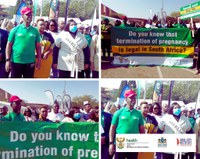Soul City Institute supports calls for transformative sexual and reproductive health services for the youth
Despite abortion being recognised through the Choice of Termination of Pregnancy Act, young people still struggle to access this life-saving health service, with some resorting to unsafe abortion providers.
The Soul City Institute CEO, Phinah Kodisang, spoke during a march against unsafe abortions led by the Department of Health’s Deputy Minister, Sibongiseni Dhlomo, in Germiston, Ekurhuleni. Young people shared their challenges in accessing abortion services and other sexual and reproductive health (SRH) services such as contraceptives and HIV-related services.
“As the Soul City Institute, we believe that young people should be provided reproductive services that are transformative, friendly and accommodate their needs because we know that there is an influx of unsafe abortion service providers. We are here to stand in support and say that there should not be a market for unsafe abortion providers,” Kodisang said.
“As much as we stand in solidarity with the Deputy Minister to say unsafe abortion posters must be removed, we also want to see them replaced with the right services that are safe because they are supposed to be available at our clinics,” she added.
Dhlomo called for a multi-pronged approach where different municipalities would remove unsafe abortion services adverts littered across South Africa as soon as they are placed on lamp-posts and street lights.
“This thing is widespread across South Africa, and it is something that we can tackle if we can cooperate with councillors, mayors, police officials and the Department of Health,” said Dhlomo.
Safe spaces for all young people
At the march, posters and flyers by unsafe abortion providers were removed from lamp-posts and walls in some parts of Germiston. Kodisang said while this was a positive move to show people that the posters were unsafe providers, the industry was relentless and required a consistent awareness campaign.
“The Soul City Institute has advocated for the availability of safe services because the unsafe abortion industry is thriving. We know that even the flyers that we’ve removed will be replaced by tonight. Our responsibility is to focus on what we can do, which is to ensure that clinics provide the right services so that these unsafe abortion providers do not have a market,” Kodisang explained.
The National Department of Health established Youth Zones in clinics across the country. These are time slots dedicated to youth-friendly health services such as abortion, birth control as well as HIV testing and treatment. These Youth Zones are dedicated to addressing the needs of young people and are staffed with trained healthcare workers to provide integrated and comprehensive services. Youth Zones are one of the ways the health department addresses young people’s concerns about how they are treated at public health facilities.
Despite this mandate, adolescents and youth attendees of the event lamented on continued stigma and discrimination at facilities.
Young people highlighted their challenges in accessing SRH services, including stigma from healthcare providers who were judgemental and could not relate to their challenges because of the generational gap, and the lack of privacy at facilities.
Nondumiso Khethwa, Programmes Officer at the Soul City Institute in Gauteng, said they were operating in Ekurhuleni East with a team of SCI Social Mobilisers who link young people to youth-friendly services for 15 to 24-year-olds.
Khethwa said Soul City Institute programmes are working to break the cycle by ensuring Youth Zones are safe spaces for young people.
Kodisang said that with transformative youth-friendly services, all young people would be able to be seen and protected from the stigma that they faced at clinics.
She added: “If we are intentional about being inclusive, we would know that young people are diverse and health facilities need to accommodate young persons with disabilities, of various genders and sexual orientation as well as other needs they may have. I do not think we are there yet because we still have an attitude towards members of the LGBTQIA+ community.”
Kodisang called for more education and for those who deny young people access to health services to be held accountable.
Dhlomo said that the issue of Youth Zones not offering confidential and friendly services to young people needed to be resolved so that they could be encouraged to seek the services.
The Deputy Minister also called on School Governing Bodies (SGB) to join in the campaigns to educate children vulnerable to falling pregnant as teenagers or falling pregnant because of statutory rape about SRH.
“We have issues accessing health and sex education in schools because there are parents who want to believe that their children are not doing anything at the ages of 11 and 12 years, so they tell us not to come to the schools because we will be teaching their children wrong things. But already, 12-year-olds are falling pregnant without this intervention, so those are some of the discussions that must take place,” he added.

